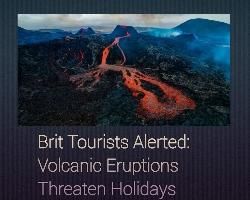Following a string of volcanic explosions, the Foreign Office has issued a severe warning to travelers regarding probable disruptions. Travelers are being advised by the Foreign Commonwealth Development Office (FCDO) to remain alert and make sure they get the most recent information before departing on their trips.
Iceland, which has seen multiple volcanic outbursts in recent weeks, is the target of the warning. There have been instances in the past when Icelandic eruptions have sent ash clouds sweeping across northern Europe, seriously disrupting air travel.
There has been a succession of volcanic explosions on the Reykjanes peninsula in south-west Iceland, the FCDO stated in a cautionary statement. "No travel can be guaranteed safe," the agency said. The town of Grindavik and the region north of it have been impacted by these. Authorities in Iceland advise against visiting this region. There are no routes leading to Grindavik or the neighboring areas."
"The likelihood of further eruptions in this location remains high," they said, cautioning of the continued risk. When traveling, heed the instructions of the Icelandic authorities and check the local media for updates."
The FCDO's guidance highlights the broader risks associated with volcanoes globally, noting: "There are many volcanoes located around the world. If a volcano erupts, this can cause loss of life and widespread damage to property and transport and other infrastructure."
The most significant disruption from volcanoes in Iceland occurred in April 2010, when the eruption of Eyjafjallajokull volcano led to widespread air travel disruptions across Europe. The ash cloud from the eruption spread across Europe, leading to the largest air-traffic shutdown since World War II, according to the Liverpool Echo.
Over 100,000 flights were cancelled, affecting millions of passengers.
The main disruption lasted for about a week, but intermittent disruptions continued for several weeks due to ongoing volcanic activity and changing wind patterns. One year later during the Grimsvotn Eruption (2011) flights in and out of Iceland and parts of the UK, Ireland, and Scandinavia were hit.







.svg)


